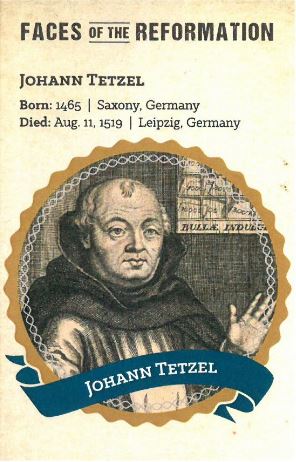Celebrating the 500th Anniversary of the Reformation
Faces of the Reformation – Johann Tetzel

Who Was Johannes Tetzel?
For our next installment of our Reformation history, dear readers, you will read about one of the most well known people in the Reformation story and also one of the most unpopular people in the Reformation story! You will read about Johann or Johannes Tetzel.
Johann Tetzel was born in 1465 in Pirna, in Saxony, Germany. He attended the University of Leipzig and when he graduated with a bachelor of arts degree, he joined the Dominican order of Monks in 1489. He was named an inquisitor of heresy in Poland and in 1517 he was named a commissioner of indulgences for Archbishop Albrecht von Brandenburg.
“Indulgences”
The Catholic church doctrine of Indulgences began early in the Middle Ages. The forgiveness that an indulgence purchased was said to come from a “Treasury of Merits.” This was a cache of remission that was collected from the deaths of Jesus Christ and the martyrs. An indulgence was a cancellation of the punishment of sin either here on earth or for someone who had already died and was now in purgatory. The Catholic church authorized and supported the sale of these indulgences and soon it became a wonderful way to raise money for many church projects. Officially, the indulgence paper stated that the bearer had paid the indulgence price and would be entitled to full remission of sins when they were confessed to a priest.
This official church position was something Martin Luther preached against because he was afraid that people would buy an indulgence, say they were sorry and not really feel concern about repenting of their sins. He was sure that Pope Leo would see the danger in the sale of indulgences and stop their sale. Just the opposite happened, however. The Pope continued to defend the sale of these pieces of paper, because the money raised did much to help the pope’s luxurious lifestyle, and also help to pay for his reconstruction plans for the Basilica of St. Peter in Rome.
Tetzel Steps In
And now, enter Johann Tetzel. He turned out to be a wonderful salesman. His sales pitch was simple:
“As soon as a coin in the coffer rings, the soul from purgatory springs.” He was soon raising a lot of money (A LOT!), first for his Archbishop, who had incurred much debt in securing his position as archbishop
and then for Pope Leo and his plans for St. Peter’s Basilica. Johann Tetzel continued to sell indulgences, telling people that they could be purchased for other family members or friends even if they had already died, and he did not tell people about the need to confess the sins they paid an indulgence for. According to Tetzel, the indulgences became a “Get Out of Jail Free” card for people.
Luther’s Response
This is what finally prompted Martin Luther to write his Ninety-Five Theses and nail them to the Wittenberg Church door. If you read the theses, you will see many of them directly refute Tetzel’s practices.
After just a few years, people realized that the purchase of an indulgence was not what they thought it was, the Catholic church realized that selling indulgences was really a dangerous practice for the faith and life of their members, and Johann Tetzel fell from popularity. He finally retreated to the monastery in Leipzig and died in 1519 of plague. When Martin Luther heard that Tetzel lay dying, he wrote to him.
His letter was one of consolation and comfort and he said, “do not be troubled, for the matter did not begin on your account, but the child had quite a different father.” Luther wanted Tetzel to know that while he preached against the doctrine of indulgences, he was not attacking Tetzel personally. The sale of indulgences was, in fact authorized by the church as early as 1476, much before Johann Tetzel began to sell them. Johann Tetzel is buried in the Dominican Church in Leipzig.